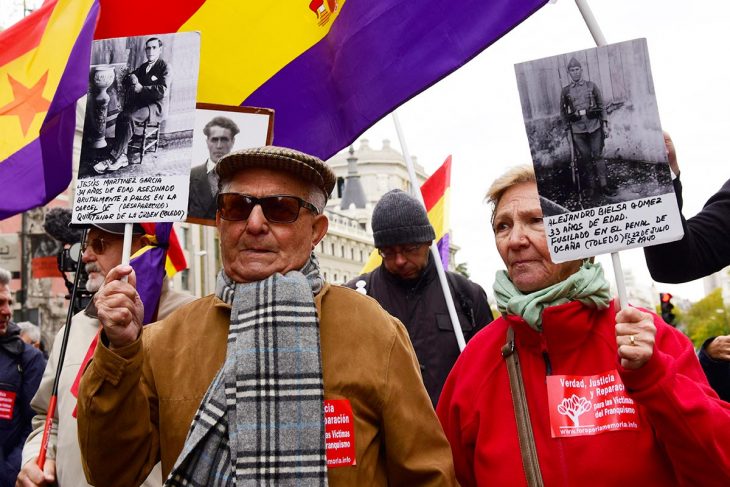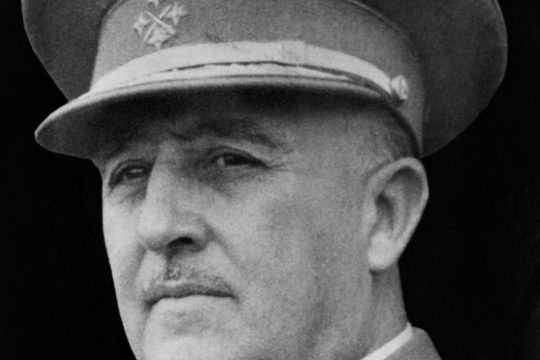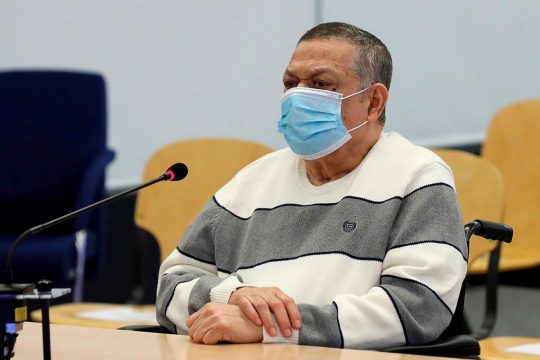On 21 October 2022, the Democratic Memory Law (Ley de Memoria Democrática) entered into force in Spain. The law seeks to fulfil the rights of victims of the 1936 to 1939 civil war and the ensuing Francoist dictatorship that lasted until the death of Francisco Franco in 1975. It builds upon the rights to truth, justice, reparations and guarantees of non-recurrence, as recommended in various UN reports, including by former Special Rapporteur Pablo de Greiff and by the Working Group on Enforced or Involuntary Disappearances.
While the new law is an important step forward in relation to its predecessor, the 2007 Historic Memory Law (Ley de Memoria Histórica), it still falls short in key areas. First, a blanket amnesty continues to prevent prosecutions. In 1977, Spain used a popular demand for amnesty for those languishing in prisons for political reasons, to enact a law that would make it impossible to prosecute state officials responsible for crimes committed during the Civil War and in Francoist Spain. Second, in the area of reparations, while the new law includes measures of restitution, rehabilitation and satisfaction, it does not provide for economic compensation. This contravenes international standards on the obligation to provide full reparation to victims.
Even though the law has been carefully drafted to respect the 1977 Amnesty Law and to avoid compensation, it is being strongly opposed by conservative parties in the opposition. These parties consider the law as an attack to the ‘spirit’ of the 1978 transition to democracy. In fact, Alberto Núñez Feijóo, president of the Popular Party, has already expressed that he will derogate this law if he becomes the new Spanish Prime Minister.
It is in such responses that we can clearly see that Spain has a problem with its past, which is, at the same time, a problem with its present and future. In Spain, victims’ rights are portrayed as falling within the sphere of party politics. For example, between 2012 and 2018, the Popular Party halted the financial support for exhumations of victims of the Civil War and of Franco’s dictatorship, leading to costs being borne by their families and civil society organizations. In doing so, the international obligation of states to search, locate and identify the disappeared was placed on the victims and their families. This undermines the very idea of human rights that the “West” has been promoting elsewhere.
A new prosecutor’s office for human rights
Given this conjuncture, despite the serious shortfalls of this law and against those who see it as a threat, we argue that it can only strengthen democracy. To start with, the new Democratic Memory Law adopts human rights norms and standards that have long been ignored by successive governments. In this vein, while the 1977 amnesty law precludes prosecuting perpetrators, it does not foreclose investigations.
The new law creates the public prosecutor’s office for human rights and democratic memory, to investigate past violations and to promote the search for the whereabouts of the disappeared. In addition, it broadens the definition of ‘victim’ and gives due recognition to children, who were abducted and adopted without parental consent, to their parents and siblings. It also stipulates that it is the responsibility of the state to carry out exhumations and the search for persons who disappeared during the Civil War and the Franco dictatorship. Given these important advances, to argue that the law is an attack on the 1978 transition to democracy is meant to undermine the universality of human rights.
From ‘dealing with a recent past’ to ‘colonial legacies’
In Spain, the state has been unable and unwilling to begin a genuine process of reconciliation with its recent past. This has left the country with a low intensity democracy unable to look back in a truthful manner. Such inability obscures and re-describes both the country’s recent past and Spain’s colonial legacies. In contrast, other ‘more established’ democracies are opening their colonial past to scrutiny, a courageous step at a time when democracies are being hollowed out across the globe.
Canada’s multiple inquiries into the treatment of Indigenous people, including the Truth and Reconciliation Commission (2009-2015), have examined human rights violations that occurred in Indigenous residential schools over the period of 1874–1996. Australia’s Yoo-rrook Justice Commission (2021) is now examining the impact of European colonization on the Aboriginal communities of Victoria State. In Europe, Norway (2018), Finland (2019) and Sweden (2020) have established commissions to investigate injustices against Indigenous peoples. In 2020, Belgium established the Special Parliamentary Commission to look into the country's colonial history and the social, political and economic effects of colonialism in Congo, Rwanda, and Burundi. These are all indicative of the manner in which other states are attempting to reconcile with their past in order to democratize in the here and now.
Unapologetic King of Spain
Spain’s citizens and their institutions can learn with such processes. Yet, the country seems reluctant to do so. In August, Felipe VI, king of Spain, attended the investiture of Colombia’s new president, Gustavo Petro. During the ceremony, Simón Bolívar’s sword was presented. The sword is a symbol of the fight for Independence of Latin American states, and Felipe VI is the monarch of the once colonial power that counted Columbia in its domains. Yet, the king was the only dignitary that did not stand up to welcome this recognition. Similarly, in 2019, Mexican president Andrés Manuel López Obrador sent a letter to the Felipe VI and another to Pope Francis, demanding that they apologize to Indigenous peoples for the human rights violations of colonialism. As a response, the Spanish government emphasized that it “deeply regrets” the publication of the letter and that it “firmly rejects” its argument. These examples crystalize the ongoing colonizing logics of Spanish state institutions.
In contrast, in 2020, in a letter addressed to the Head of State and people of the Congo, the Belgian king expressed regrets for Belgium’s colonial past. In March 2020, the Dutch king apologized “for the excessive violence of the Dutch” during the repression of the Indonesian independence movement between 1945 and 1949. The 2021 agreement between Germany and Namibia includes acknowledgement of the genocide against the Ovaherero and Nama peoples (1904 to 1908), public apologies, and development assistance as compensation.
Decolonizing to deepen democracy
If Spanish citizens and their institutions are able to reconcile with the victims of its recent past, it will open the path for reconciliation with the victims of its colonial history. Once this happens, Spain will be able to embrace the strange multiplicity of diverse peoples, cultures, civilizations and languages that have contributed to what is today referred to as Spain. From such a space, different logics and ways that dictatorship and colonialism have obscured and re-described, will be heard in their own voice and their own ways. At that point, the country will be looking back and moving forward in a democratizing and decolonizing key.
Only when a country marred with an imperialist and colonialist past is able to decolonize its logics, can it democratize in an ongoing manner. Because of the fact that representative democracies everywhere are in crisis, such decolonizing and democratizing gestures present ways forward out of gridlock and decay. Integrating these experiences of colonial and racial violence and recognizing continuities between past and present forms of injustice, is essential if human rights are to be recognized as truly universal.

Carles Fernandez-Torne is an Adjunct Professor on transitional justice and conflict analysis and Globalcodes researcher at Blanquerna-Universitat Ramon Llull. He is also an Associated Expert at the swisspeace Dealing with the Past Program. His latest publication, ‘Still disappeared’: reconstructing the 1990 ‘truth commission’ in Nepal, Contemporary South Asia, 2022.

Pablo Ouziel is co-founder of the Cedar Trees Institute at the University of Victoria. He is author of the book Democracy here and now: The exemplary case of Spain, University of Toronto Press, 2022.







